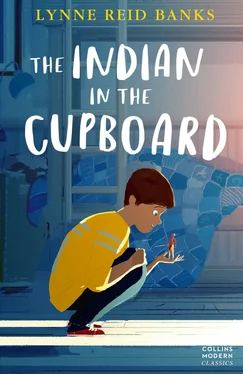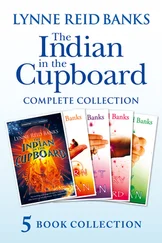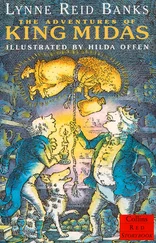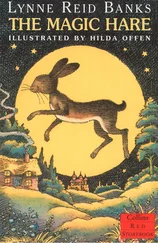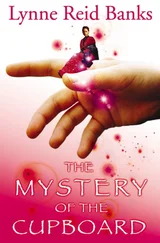At the very best, the Indian must have passed a horrible day in that dark prison. Omri was dismayed at the thought of it. Why had he allowed himself to be drawn into that silly row at breakfast instead of slipping away and making sure the Indian was all right? The mere thought that he might be dead was frightening Omri sick. He ran all the way home, burst through the back door, and raced up the stairs without even saying hello to his mother.
He shut the door of his bedroom and fell on his knees beside the bedside table. With a hand that shook, he turned the key in the lock and opened the cupboard door.
The Indian lay there on the floor of the cupboard, stiff and stark. Too stiff! That was not a dead body. Omri picked it up. It was an ‘it’, not a ‘he’, any more.
The Indian was made of plastic again.
Omri knelt there, appalled – too appalled to move. He had killed his Indian, or done something awful to him. At the same time he had killed his dream – all the wonderful, exciting, secret games that had filled his imagination all day. But that was not the main horror. His Indian had been real – not a mere toy, but a person. And now here he lay in Omri’s hand – cold, stiff, lifeless. Somehow through Omri’s own fault.
How had it happened?
It never occurred to Omri now that he had imagined the whole incredible episode this morning. The Indian was in a completely different position from the one he had been in when Patrick gave him to Omri. Then he had been standing on one leg, as if doing a war-dance – knees bent, one moccasined foot raised, both elbows bent too and with one fist (with the knife in it) in the air. Now he lay flat, legs apart, arms at his sides. His eyes were closed. The knife was no longer a part of him. It lay separately on the floor of the cupboard.
Omri picked it up. The easiest way to do this, he found, was to wet his finger and press it down on the tiny knife, which stuck to it. It, too, was plastic, and could no more have pierced human skin than a twist of paper. Yet it had pierced Omri’s finger this morning – the little mark was still there. But this morning it had been a real knife.
Omri stroked the Indian with his finger. He felt a painful thickness in the back of his throat. The pain of sadness, disappointment, and a strange sort of guilt, burnt inside him as if he had swallowed a very hot potato which wouldn’t cool down. He let the tears come, and just knelt there and cried for about ten minutes.
Then he put the Indian back in the cupboard and locked the door because he couldn’t bear to look at him any longer.
That night at supper he couldn’t eat anything, and he couldn’t talk. His father touched his face and said it felt very hot. His mother took him upstairs and put him to bed and oddly enough he didn’t object. He didn’t know if he was ill or not, but he felt so bad he was quite glad to be made a fuss of. Not that that improved the basic situation, but it was some comfort.
“What is it, Omri? Tell me,” coaxed his mother. She stroked his hair and looked at him tenderly and questioningly, and he nearly told her everything, but then he suddenly rolled over on his face.
“Nothing. Really.”
She sighed, kissed him, and left the room, closing the door softly after her.
As soon as she had gone, he heard something. A scratching – a muttering – a definitely alive sound. Coming from the cupboard.
Omri snapped his bedside light on and stared wide-eyed at his own face in the mirror on the cupboard door. He stared at the key with its twisted ribbon. He listened to the sounds, now perfectly clear.
Trembling, he turned the key and there was the Indian, on the shelf this time, almost exactly level with Omri’s face. Alive again!
Again they stared at each other. Then Omri asked falteringly, “What happened to you?”
“Happen? Good sleep happen. Cold ground. Need blanket. Food. Fire.”
Omri gaped. Was the little man giving him orders? Undoubtedly he was! Because he waved his knife, now back in his hand, in an unmistakable way.
Omri was so happy he could scarcely speak.
“Okay – you stay there – I’ll get food – don’t worry,” he gasped as he scrambled out of bed.
He hurried downstairs, excited but thoughtful. What could it all mean? It was puzzling, but he didn’t bother worrying about it too much. His main concern was to get downstairs without his parents hearing him, get to the kitchen, find some food that would suit the Indian, and bring it back without anyone asking questions.
Fortunately his parents were in the living-room watching television, so he was able to tiptoe to the kitchen along the dark passage. Once there, he dared not turn on a light; but there was the fridge light and that was enough.
He surveyed the inside of the fridge. What did Indians eat? Meat, chiefly, he supposed – buffalo meat, rabbits, the sort of animals they could shoot on their prairies. Needless to say there was nothing like that.
Biscuits, jam, peanut butter, that kind of thing was no problem, but somehow Omri felt sure these were not Indian foods. Suddenly his searching eyes fell on an open tin of sweetcorn. He found a paper plate in the drawer where the picnic stuff lived, and took a good teaspoon of corn. Then he broke off a crusty corner of bread. Then he thought of some cheese. And what about a drink? Milk? Surely, Indian braves did not drink milk? They usually drank something called ‘fire-water’ in films, which was presumably a hot drink, and Omri dared not heat anything. Ordinary non-fire water would have to do, unless … What about some Coke? That was an American drink. Luckily there was a bit in a big bottle left over from the birthday party, so he took that. He did wish there were some cold meat, but there just wasn’t.
Clutching the Coke bottle by the neck in one hand and the paper plate in the other, Omri sneaked back upstairs with fast-beating heart. All was just as he had left it, except that the Indian was sitting on the edge of the shelf dangling his legs and trying to sharpen his knife on the metal. He jumped up as soon as he saw Omri.
“Food?” he asked eagerly.
“Yes, but I don’t know if it’s what you like.”
“I like. Give, quick!”
But Omri wanted to arrange things a little. He took a pair of scissors and cut a small circle out of the paper plate. On this he put a crumb of bread, another of cheese, and one kernel of the sweetcorn. He handed this offering to the Indian, who backed off, looking at the food with hungry eyes but trying to keep watch on Omri at the same time.
“Not touch! You touch, use knife!” he warned.
“All right, I promise not to. Now you can eat.”
Very cautiously the Indian sat down, this time cross-legged on the shelf. At first he tried to eat with his left hand keeping the knife at the ready in his right, but he was so hungry he soon abandoned this effort, laid the knife close at his side and, grabbing the bread in one hand and the little crumb of cheese in the other, he began to tear at them ravenously.
When these two apparently familiar foods had taken the edge off his appetite, he turned his attention to the single kernel of corn.
“What?” he asked suspiciously.
“Corn. Like you have—” Omri hesitated. “Where you come from,” he said.
It was a shot in the dark. He didn’t know if the Indian ‘came from’ anywhere, but he meant to find out. The Indian grunted, turning the corn about in both hands, for it was half as big as his head. He smelt it. A great grin spread over his face. He nibbled it. The grin grew wider. But then he held it away and looked again, and the grin vanished.
“Too big,” he said. “Like you,” he added accusingly.
“Eat it. It’s the same stuff.”
Читать дальше
